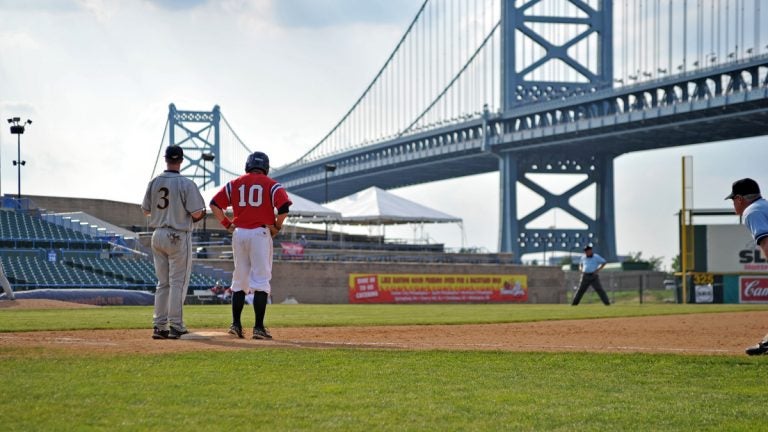Was building Camden’s baseball stadium a mistake?

Dayton baseball player Mel Skochdopole (No. 10) stands on first base in an Atlantic 10 tournament game, with the Ben Franklin Bridge in the background on May 25, 2011 in Camden, N.J. (Photo via Shutterstock)
Build it and they will come. That was and still is the hope for those who built and paid for Camden’s baseball stadium, Campbell’s Field, along the Delaware River. The ballpark is home to the Camden Riversharks, an independent professional baseball team whose players rank one notch below the majors.
Opening day in 2001 was a hit with a packed stadium and great fanfare for the future of the city’s waterfront.
But since 2004, loan payments have fallen behind and in December Santander Bank filed a lawsuit against Camden Baseball, which owns the team, and Cooper’s Ferry Development Association Baseball Properties, saying they have missed too many loan payments. But in response late Feburary, lawyers for both Camden Baseball and CFDA Baseball asked that the suit be thrown out, arguing that it’s not their problem anymore.
Camden Baseball is blaming Santander for waiting too long to pursue remedies. Team owners further note that the bank accepted a $200,000 payment last year despite rejecting an offer to restructure the loan payments.
As for CFDA Baseball, it’s a little more complicated. The entity was created in the early 2000s by Camden’s Cooper’s Ferry Development Association (now called “Cooper’s Ferry Partnership” or “CFP”) solely to facilitate the development of the stadium. It exists only on paper, and CFP President David Foster says his organization has no financial or legal obligations related to it. CFP is not named in the lawsuit and according to Foster isn’t on the hook for the loans either.
Nonetheless, Foster says Cooper’s Ferry is doing whatever it can to get this situation resolved. “Cooper’s Ferry is working with all of the parties involved in the financing, ownership and operation of the baseball stadium to resolve the current situation in a way that ensures a long-term future for minor league baseball on the Camden Waterfront,” he said.
Santander’s attorneys say that because Camden Baseball took on full financial responsibility by agreeing to guarantee the loan received by CFDA, which transferred the stadium title to Rutgers University in 2000, Camden Baseball needed to pay $4.6 million on December 3, 2013, to bring the account current.
Under the terms of the agreement, bank attorneys say Camden Baseball is to make its lease payments, which amount to the same as the loan payments, directly to the bank in order to skip the middle man, or stadium owner.
Said owner, Rutgers University, says although it holds the title to the stadium, the loan payments are not the school’s responsibility. “The lease provides Rutgers some access to the stadium for events and for the use by the Rutgers University, Camden Division III baseball team. In addition there are some agreements for ticket packages, field maintenance, etc. but no obligations to meet the debt service,” Vice Chancellor for Administration and Finance Larry Gaines said in an email response.
Santander in its court filings is threatening to seize the stadium if loan obligations aren’t met.
A hearing on the matter is scheduled for April 7 in U.S. District Court in Trenton.
The future of the Camden Riversharks?
Regardless of who has to pay back the loans, we’re left with an important question: Is the era of professional baseball in Camden over?
Ticket sales were used to help payback the bank’s loans but after the fanfare of the stadium’s grand opening in 2001 attendance has dropped and the team itself isn’t that good.
The Riversharks have only had five winning seasons out of 13. Last season, it averaged 3,462 seats sold per game in a stadium with capacity for 6,425, according to the Atlantic League of which it’s part. Of the Riversharks’ league rivals, only the Bridgeport Bluefish sold fewer tickets during the 2013-14 season but its stadium seats 1,125 fewer fans than does Campbell’s Field.
Not part of MLB systemAnother challenge for the Riversharks is that it’s not in Major League Baseball’s farm team network. The Riversharks form part of an independent league whose professional players are ready to be called up to the majors at any time but whose teams aren’t affiliated directly with MLB the way minor-league teams are. Because there’s no chance of catching a Jose Conseco or a Derek Jeter cooling off with his farm team for a few weeks while they nurse an injury, attendance at independent league games can be sparse, though some teams do cultivate devoted followings. In Camden, however, not so much.
“Some teams are hugely successful,” said Bob Wirz, author of the weekly newsletter “Independent Baseball Insider.” “Camden brings up the back end.”
Camden’s bad reputationPerhaps Campbell’s Field’s placement in the nation’s most violent city scares away some would-be fans, though its location in the waterfront entertainment district ensures it’s well-patrolled and far away from the city’s danger spots. But it may be that baseball enthusiasts just don’t find the experience to be worth the money.
For the past two years, Medford resident Shauna McMunn has bought discounted tickets but would hesitate to pay full price.
“It’s never crowded, the amenities are kind of sad and the food seems way overpriced,” she says. As for the pre- and post-game entertainment, she calls it laughably amateur, even pathetic.
“I know that minor-league baseball is supposed to have the small-town community feel to it but I have been to other stadiums that seem to do it better,” she said in an email. “It’s more like the crowd is laughing at the entertainment versus because of the entertainment.”
For his part, Jonathan Latko, president of the neighborhood association that includes the waterfront stadium area, hopes the Riversharks remain and calls them a “force for positive” for the neighborhood and city.
“They provide family-friendly entertainment, food, community outreach, fireworks, jobs, parking revenue, and bring family-oriented crowds in from the region,” he says.
It can be argued that the lack of interest isn’t for lack of trying by the front office. Players have been spotted occasionally roaming the neighborhood offering free tickets to passersby, and marketing officials plan weekly promotions and other events, like onsite beer festivals, to coincide with games. But beer fest attendance proved low in recent years, and it does not appear on the 2014 schedule.Latko says he’s been assured of the team’s return. “I was told there will be baseball this season,” he said, while declining to identify who said so. The Riversharks are scheduled to play their home-opener Friday, May 2.
__________________________________________
Ed. note: Tara Nurin lives in Camden’s Cooper Grant neighborhood, where Campbell’s Field is located.
WHYY is your source for fact-based, in-depth journalism and information. As a nonprofit organization, we rely on financial support from readers like you. Please give today.




